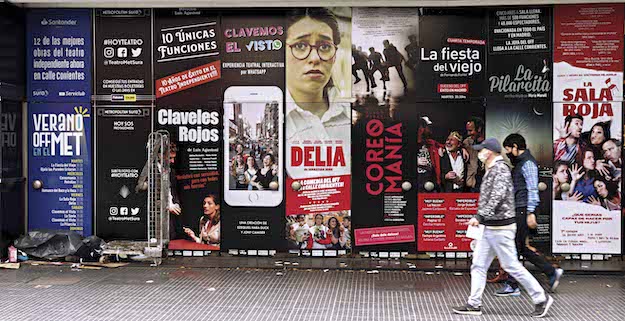This article is adapted from AQ’s special report on closing the gender gap.
BUENOS AIRES — One of the stranger TV shows to dominate Argentina’s pandemic airwaves is Bienvenidos a Bordo (Welcome Aboard), a game show in which taxi drivers compete for prizes ranging from a giant pile of candy to a brand-new cab.
The show is simultaneously delightful and heartbreaking — the small talk with contestants a demonstration of national resilience and a reminder of crushing economic crises past and present. Corny or not, it’s hard not to feel that the show—and TV in general—meets the changing definition of “essential.” As Argentine media expert Pablo Méndez Shiff put it, “We’d be worse off without it.”
Bienvenidos a Bordo, broadcast by the free-to-air El Trece, has survived — and thrived — because it’s been able to adapt to the COVID-19 landscape: Contestants compete on an open-air stage, and their only interaction with the host is on a Zoom-style screen.
But not all of the country’s film and TV industry — long viewed as a regional leader — has been so lucky.
After six months of lockdown, unemployment among actors was at a record high 90%. The country’s largest narrative content producer, with more than 300 employees, was on the brink of closure. And a group of leading actors launched a plea for government assistance. Buenos Aires’ cultural ministry recently moved to allow film and TV crews to get back to work. But the months off have taken their toll.
There’s an old trope in Argentina about how crises are opportunities — the idea even has its own portmanteau: oportucrisis. If that idea holds true, Argentina’s audiovisual industry is rife with possibility.
And there are, in fact, those who believe the industry could make use of the COVID-19 crisis. So long as it’s willing to get creative.
Part of the reason is that Argentina’s film and TV industry, despite its reputation, was already facing obstacles before the pandemic began. Productions were ordered to halt in March, but there was actually only one fiction TV series shooting at the start of the quarantine.
Like everything else in Argentina, the industry’s pendulum swings in sync with the country’s notoriously volatile economic cycles. The industry took a hit during Argentina’s 2001 economic crisis, then recovered to a degree under the Kirchner administrations, which poured money into public television.
Funding fizzled under former President Mauricio Macri’s government, which pared down culture budgets, alongside other austerity measures, amid an economic downturn. The combination of government policy and a difficult economy gradually choked off both public and private productions.
Some advocates now hope that the challenge from COVID-19 could prompt the industry to change, making better use of public funds and exploring new ways of delivering and promoting content. Argentina’s long-standing financing system, which taxes movie theaters and TV channels and uses those funds to subsidize domestic productions, is one area some say is ripe for reform.
On several counts, the tax has been a success, sheltering the industry from competition and allowing productions to move forward based on more than just immediate commercial viability. But in a country where yearly inflation can top 50%, actual payouts for such projects can take years. By the time subsidies are paid out, the original budgets are far off base from current prices, or set in devalued pesos that are insufficient to pay back costs incurred in dollars.
The lag can be devastating for small producers, and also ends up diminishing the return on state funds. Observers say that streamlined public financing is necessary to keep the system viable.
A potential silver lining is that economic downturn and currency devaluation make Argentina a cheap place for international productions. A strong pool of local technical talent and Buenos Aires’ European-looking streets make the country a popular destination for commercial shoots. This may also be part of why Netflix this year announced plans to open offices in the capital and invest heavily in local production. In recent years, the city has implemented policies, including streamlined permitting, to make it a welcoming location for international crews.
Still, the pandemic has forced industry workers to get creative. Federico Suárez, an ad producer, recently spent two full days directing a Bolivian beer commercial from his Buenos Aires living room — the “new normal” for the Argentine audiovisual industry. “Remote directing in slippers,” he quipped ruefully. The distance means there is no risk of contagion, but it can still be frustrating for a producer obsessed with details.
“I’m trying to manage that anxiety of not being on set,” Suárez told AQ. He conceded that he’s among the lucky ones who have managed to work from home, while many peers are unemployed or “escaping” the country toward places with looser lockdowns, namely Uruguay or Europe.
In the meantime, while filmmakers, actors and producers like Suárez continue to adapt, Argentines will look for new distractions on screen — and more escape hatches like Bienvenidos Abordo.
__
Timerman is a freelance reporter in Buenos Aires and she edits the Latin America Daily Briefing








